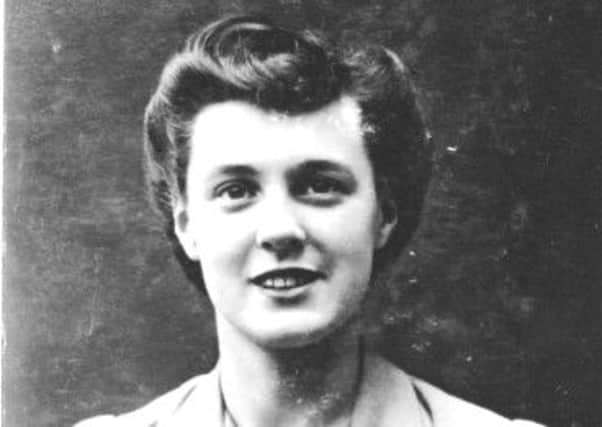Obituary: Rene Grant, sanitary inspector, poultry keeper and care assistant


HAD she bowed to her father’s wishes Rene Grant would have followed the family tradition of working on the railways.
The daughter of a signalman and sister of a railwayman, it was what was expected of her. But the feisty young woman had other ideas and when the opportunity came to train as one of Scotland’s first qualified female sanitary inspectors, she rose to the challenge.
Advertisement
Hide AdAdvertisement
Hide AdShe stepped in to fill the gap left by men who had gone to war and although her job choice raised a few eyebrows, she relished the opportunity to forge a pioneering career in public health and to help make a difference to those enduring appalling living conditions in some of Edinburgh’s most deprived areas.
Following her marriage she went on to live the “good life” in rural West Lothian, overseeing 500 chickens, an assortment of geese, ducks, a goat and pony plus several hives of bees, before changing course once more to work with children with severe disabilities.
And though widowhood almost 20 years ago left a huge hole in her life, it did not blunt her spirit: “I’ve still got a lot of damage to do yet,” she once joked.
Born in Stirling, she and sister Evelyn were a second family for father Sandy, who remarried after the loss of his first wife. Tragedy struck again when her mother Catherine Amelia died when Rene was eight and her sister just four. The girls were then raised by their half-sister Becky who returned home from her job in service in Bridge of Allan to keep house.
After leaving Stirling’s Riverside School in her mid-teens, Rene trained as a shorthand typist and worked in a solicitor’s at the town’s Corn Exchange. The office was across the road from the local council where she moved next, again as a shorthand typist. By this time the Second World War was well under way and the burgh’s chief sanitary inspector was experiencing a shortage of vital workers as many of the men had gone off to fight.
As a result he offered her the chance to train as a sanitary inspector. She readily agreed. Though her father’s friends and colleagues considered it a daft thing for a girl to do, he supported her and she studied at night school to gain her qualifications. During the war she was also a firewatcher, keeping an eye out for incendiary bombs.
She was awarded her sanitary inspectorate certificate in 1946; her achievement featured in the local paper as a trailblazing lady inspector.
From there she moved to the Public Health offices in Edinburgh where her duties took her to severely deprived areas where overcrowding, disease and unsanitary living conditions were commonplace. Her role also included taking samples of foodstuffs, milk and water for testing, particularly when infections broke out.
Advertisement
Hide AdAdvertisement
Hide AdHer working life in Edinburgh was a sociable one and it was through work that she met future husband Bill Grant, who ran the payroll at her offices. They married in Stirling North Church in August 1951 and, as a young wife, she gave up work.
Three children followed and by the early 1960s the family had left their home in Corstorphine to move to The Loan, near Linlithgow.
Bill, who had a hankering to own his own land, was the driving force behind the move to the property with two acres of ground and Rene found herself in charge of the poultry, goat and bees while her husband, an excellent apiarist, kept on his full-time job. He would milk the goat before he left for the office, often taking him with him several dozen eggs, packed into an old suitcase, for sale to colleagues.
Meanwhile his wife ran the smallholding, cleaned and graded several hundred eggs daily, which were also sold locally, plucked and cleaned 50 cockerels at Christmas and turned the produce from their huge fruit and vegetable garden into copious quantities of soup and jam. Virtually self-sufficient, they had no need to buy milk for years.
Her own love of home-grown food was a throwback to her childhood – her big sister’s culinary skills and her father’s vegetables – and helped to turn her into a warm, considerate hostess defined by her home-making, ability to show love through cooking and love of people.
Once the children were in their teens, she also found time to go back to work outside the home, this time as a care assistant for children with special needs, travelling round the countryside picking up the pupils of Beatlie School, Winchburgh, in a mini bus.
It was hard work but a humbling experience and she fulfilled the role with compassion.
In retirement, the couple moved to a cottage in Linlithgow where she was a member of the 50-plus walking group and the film society. They also enjoyed travel to Portugal, Jerusalem and the Holy Land and to visit their son in Canada.
Advertisement
Hide AdAdvertisement
Hide AdWidowed in 1995, she was supported enormously by her sister Evelyn. And despite her physical frailties latterly – she underwent four hip operations – she remained interested and interesting, always opinionated and fascinated by politics. Among her pastimes were bellowing at Question Time, followed by a post-programme analysis, plus the daily ritual of reading The Scotsman cover to cover.
She is survived by sons Ian and Donald, daughter Alison, sister Evelyn, grandchildren and extended family.